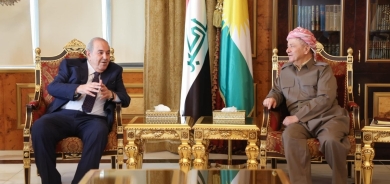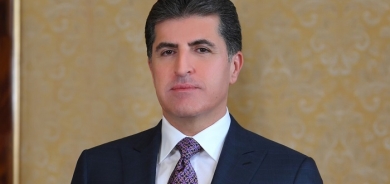Costantino Pischedda: Complete destruction of [ISIS] is a worthwhile goal but will require more than military means
December 27, 2015
Exclusive Interviews
![Costantino Pischedda: Complete destruction of [ISIS] is a worthwhile goal but will require more than military means](https://gulanmedia.com/public/old_images/t_dimana/7765.gif )
CP: I would say that in the aftermath of the Paris attacks the commitment of the international anti-ISIS coalition has been somewhat strengthened, but the change to me does not seem to amount to a radical shift from the preexisting level of effort against Daesh as much as a rhetorical move (for example, France was already bombing ISIS targets in Iraq and Syria; after the Paris attack it has so far merely increased the intensity of its air campaign). In other words, we have been witnessing a war between an international coalition led by the US and an armed organization -- ISIS -- that claims statehood from before Paris, although that war has intensified somewhat since then.
Gulan: After the attacks, France declared a state of emergency, and extended it for another three months, and other European countries have tighten security measures, to what extent declaring a state of emergency in European continent will lead to promoting stability at the expense of democracy?
CP: There is a risk that counterterrorism measures aimed at ensuring European citizens' security undermine democracy. Democracies in a sense always face a tradeoff between security and civil liberties, as terrorist organizations take advantage of constraints on state policing power to recruit, organize and conduct attacks. Striking the right balance between the two is a serious challenge. Erring on the side of security is as dangerous as the opposite problem of being excessively complacent: a highly repressive security apparatus can make it virtually impossible for terrorist organizations to operate within a country but that would come at the high cost of seriously curtailing the liberties that European citizens cherish. This would be a pyrrhic victory in my view.
Gulan: After the Russian intervention in Syria and immediately after it suffered a military defeat in Sinjar the ISIS shifted it is strategy from a regional strategy one to a global one, which is the strategy of AL-QAIDa, what is your interpretation of this shift, don’t you think that ISIS is starting to lose faith of expanding and consolidating it is Caliphate in Iraq and Syria?
CP: ISIS has been steadily losing ground in Iraq and Syria since the beginning of this year. According to some estimates, the group lost 10 of the territory it held between January and June 2015, and it has kept losing ground between July and now. So it is plausible that ISIS opted for a high risk gamble (switching from a regional to a global approach) in a desperate attempt to reverse this negative trend. Unfortunately at this stage we lack information on ISIS' internal decision-making. In any case, it is likely that the decision to switch to a global approach (if there was one) occurred before the fall of Sinjar, as planning for the attacks in Egypt, Lebanon and Paris probably took some time.
Gulan: Right now the Interpol has announced the names of 6,500 European citizens whom have traveled and joined the ISIS in Syria and Iraq, what sort of security challenges and threats these countries face in case of returning of these fighters ?
CP: Returning foreign fighters represent a serious threat, which should be dealt with by increasing intelligence and police resources devoted them to it. This is not a new phenomenon but its scale seems unprecedented, certainly much larger than what we have seen during the US occupation of Iraq. It's important to note that the level of threat posed by foreign fighters is likely to be higher in the aftermath of the civil wars in Iraq and Syria. If ISIS' "caliphate" were to be dismantled, then foreign fighters' obligation to defend the new state would give way to their duty to conduct Jihad wherever they can, including their countries of origin.
Gulan: The condition of Middle East in general and in Syria and Iraq in particular is conducive for nurturing the sectarian extremism between Shias and Sunnis, the question is how do we build a culture of co-existence and establish stability in this unhelpful environment?
CP: I think a key step in this direction would be achieving genuine power-sharing agreements providing the countries' ethno-sectarian groups equitable access to power and robust constitutional protection of their fundamental rights. The specific details would of course be subject to intense bargaining among the key players but a reversal of the systematic disenfranchisement of Sunni Arabs in Syria and Iraq seems to be an indispensable requirement for a long-lasting solution to the ISIS threat. Without it, large segments of the Sunni populations of the two countries will continue to see ISIS or a successor organization as a powerful defender of Sunni interests; in as much the group retains the loyalty of a substantial share of the local population it will be able to operate as a guerrilla and terrorist group even if it is dislodged from its current territorial holdings by the combined ground offensives and air power campaigns that are going on at this time. Without the large swaths of territory that the group controls today, ISIS would probably represent less of a threat in the region and for the west, but it would still be a pretty serious threat. The group after all survived the joint efforts of US, Iraqi and Awakening forces in 2007-11 by going underground, and then managed to come back with a vengeance by taking over Mosul in 2014.
Gulan: The current situation demonstrated that ISIS cannot be contained, and there is no possibility to reach a truce with it, and even we cannot negotiate with it, so how the counter-terror strategy should be revisited for defeating ISIS?
CP: I agree with the claim that no negotiated solution with ISIS is possible: the group has extreme goals not limited to one or few countries and appears absolutely unwilling to compromise on any of them. However, I don't think recent events show that ISIS cannot be contained. Containment should not be defined in terms of reducing to zero the probability of another large scale attack by ISIS; containment may be more reasonably understood as seriously limiting the group's ability to expand to other areas of Iraq and Syria and neighboring counties and making sure that it has a relatively limited safe havens in Iraq and Syria where it can freely operate and plan attacks. In this sense, containment seems to be succeeding: the territorial advances of ISIS in both Syria and Iraq are behind us; this year, the group has been losing ground under sustained military pressure and its continuation would probably lead to a further loss of territory for ISIS and thus a reduction of its ability to organize and conduct attacks outside the theater of operations. As noted, if it is not destroyed but simply contained, ISIS will continue to pose a threat, although a more manageable one. Complete destruction of the organization is a worthwhile goal but will require more than military means: addressing some key legitimate grievances of the Sunni Arab populations of Iraq and Syria will be essential. US diplomatic efforts should make this a priority.















